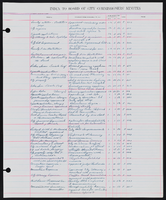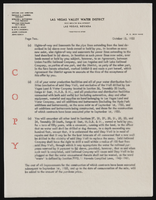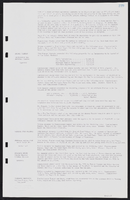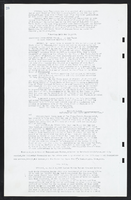Search the Special Collections and Archives Portal
Search Results

Transcript of interview with George Gilbert by Ruth Guidi, February 10, 1975
Date
Archival Collection
Description
On February 10, 1975, Ruth Guidi interviewed George Gilbert (born 1931 in Southgate, California) about his life in Nevada. George first talks about his education in Las Vegas and his family background. He also talks about times during World War II, the shopping facilities available to those in Las Vegas, the casinos that existed, the churches that were built, and the Helldorado parades. The two also discuss social clubs, politics, the atomic testing, environmental and social changes, the Mormon Fort, Hoover Dam, and the first movie theaters.
Text

Transcript of interview with Horace Emery by Barry Sarles, March 2, 1980
Date
Description
On March 2, 1980, Barry Sarles interviewed river boatman and dam worker, Horace Emery (born 1911 in California) at his older brother’s farm in Nelson, Nevada. This interview covers the local area around Nelson and the early events that helped shape the area. Also present during the interview, Barry Sarles’s girlfriend, Diane Dobaj and Horace’s older brother, Merl Emery. Mr. Sarles also discusses his work as a river boatman on the Colorado River, working on the Hoover and Davis Dams, and employment as a factory worker in Clark County.
Text

Biographical essay by Samuel Newman, 2014
Date
Archival Collection
Description
Samuel Newman describes his experience during the Holocaust and being separated from his siblings at different orphanages. He was in Kyrgyzstan from 1943 to 1946, and at an orphanage in Poland until 1951. Newman trained in graphic arts and spent some time in the military in Israel. He came to the United States in 1968.
Text
Audio clip of interview with Sharon Walker by Barbara Tabach, October 8, 2014
Date
Archival Collection
Description
Part of an interview with Sharon Walker on October 8, 2014. In this clip, Sharon Walker is talks about family and life in Las Vegas.
Sound

Manuel J. "Manny" Cortez, four-term Clark County Commissioner, speaking at the groundbreaking of the LULAC Senior Center: photographic print
Date
Archival Collection
Description
Acknowledged as one of the most popular and influential political leaders in the State of Nevada, Manuel J. "Manny" Cortez, a 44 year resident of Las Vegas and native of Las Cruces, New Mexico, is shown above speaking at the groundbreaking of the now completed LULAC Senior Center. As a four-term Clark County Commissioner, Cortez has been highly instrumental in the development and funding of many such projects as well as in the overall dynamic growth of Las Vegas and Clark County, Nevada.
Image





